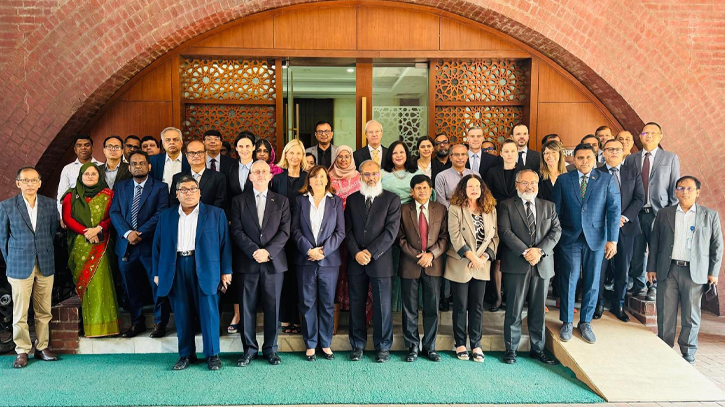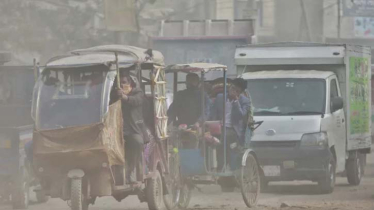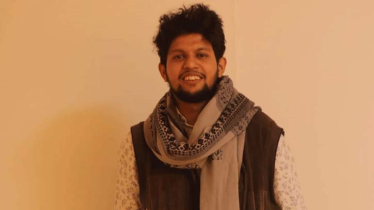
Photo : Collected
The European Union (EU) has underlined the importance of ensuring due process at all stages of the legal proceedings and expressed "concern" about the legal framework of the International Crimes Tribunal (ICT), which "should be revised" as soon as possible to bring it in line with international human rights standards.
Paying respect to the victims and survivors of the violent crackdown on protestors in July-August, as well as prior human rights violations, Bangladesh and the EU recently discussed the importance of transitional justice. They agreed on the need to hold perpetrators of human rights violations accountable.
Both sides agreed on the need to address the human rights concerns of women, children, and persons belonging to minorities and marginalised groups.
No one should live in fear of violence, harassment or discrimination while law and order "should be ensured" for all, including the most vulnerable, according to the EU.
The interim government says it condemns any kind of violence and does not want to see any violence.
The 11th meeting of the sub-group on good governance and human rights of the EU-Bangladesh Joint Commission was held in Dhaka recently under the framework of the EU-Bangladesh Cooperation Agreement.
The sub-group was co-chaired by the head of the Bangladesh delegation, Mohammad Mohiuddin, head of the Legislative and Parliamentary Affairs division at the Ministry of Law, Justice and Parliamentary Affairs, and by head of the European Union's delegation, Rensje Teerink, Head of Division for South Asia at the European External Action Service (EEAS).
They were also joined by observers from the Embassies of the EU Member States in Dhaka.
The sub-group reported to the Bangladesh-EU Joint Commission that addressed all areas of bilateral cooperation on Monday.
"Very happy to be back in Dhaka to co-chair the 11th EU-Bangladesh Joint Commission. We reviewed the wide range of cooperation during these transitional times," said Deputy Managing Director for Asia Pacific Department at the European External Action Service Paola Pampaloni after the meeting.
They conveyed EU support to reforms for an "inclusive" democratic transition.
The EU and Bangladesh reinforced their commitment to "strengthen cooperation" in the field of human rights, good governance and on-going reform process of the interim government.
They recognised that the political transition the country is currently undergoing constitutes an "unprecedented opportunity" to make progress on human rights and good governance in Bangladesh.
They paid tribute to the courage and determination of the students and members of the general public that stood up for their rights – and remembered those that lost their lives – during the popular uprising in July-August.
The EU welcomed the interim government’s "strong commitment" to advance reforms and take the necessary steps towards a "democratic, pluralistic and inclusive" Bangladesh that is grounded in the rule of law and human rights.
This commitment is notably reflected in Bangladesh’s accession to the International Convention for the Protection of All Persons from Enforced Disappearance (ICPPED), and in the creation of a Commission of Inquiry on enforced disappearances, according to the EU.
Announcements to repeal or swiftly amend some of the legislations that have been used to crush dissent and curtail fundamental freedoms, such as the Cyber Security Act, are further signals of this commitment.
Bangladesh explained the process for carrying out structural reforms in several key areas, including through the recently established reform commissions.
The EU welcomed the ongoing work of the commissions and underlined the importance of taking into account the realities and perspectives of the population in all its diversity, including women and minorities.
The need for clarity over the further process of consultation and decision-making based on the commissions’ reports was discussed.
The subgroup discussed a number of areas of reform, such as the justice sector, public administration, the security sector, and capacity building of the Legislative and Parliamentary Affairs Division.
Following up on the EU’s long-standing engagement with Bangladesh on labour rights, Bangladesh and the EU agreed on the urgency and opportunity to make progress in this regard, namely by making labour inspections more effective.
The EU recalled that the preferential access of Bangladeshi exports to the European market is premised on the respect of international human rights and labour standards.
Besides, the EU drew attention to recently adopted legislation that will reinforce the protection of human rights and labour rights, as well as improve environmental sustainability, throughout European supply chains, including for products from Bangladesh.
Messenger/Disha








